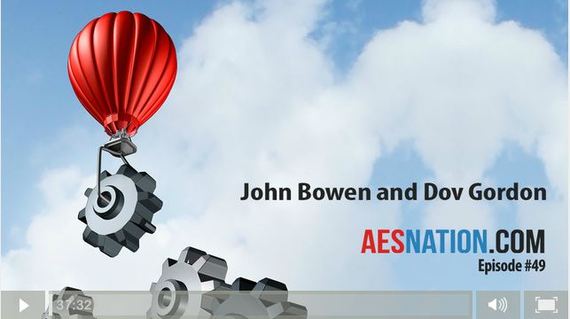Every day, we're all inundated by marketing messages -- from the formal (TV and website ads) to the informal (suggestions from friends and family). As an entrepreneur, how do you make sure your message gets through to your ideal client?
Entrepreneur and marketing expert Dov Gordon has spent his career pondering exactly that question. Gordon has built his consulting firm, Alchemist Entrepreneur, into a great success by helping small-business owners quickly identify and attract quality customers.
Gordon recently shared with AES Nation his best advice for making sure your marketing messages resonate with your ideal clients.
1. Get specific. Like many entrepreneurs, Gordon struggled early on with identifying a successful and repeatable strategy to land clients. Eventually, he realized that a great marketing message must address three key questions from your target audience right away.
The first question is, "should I pay attention?" We're constantly bombarded by marketing messages -- some reports say we face 4,000 or more marketing messages every single day -- so we've all become very good at tuning out those messages that aren't relevant to us.
If you can convince the person hearing your message that they should pay attention, the next question they'll have is, "can I trust you?" And if the answer to that question is yes, the final question is, "is this right for me?"
There's no silver bullet for getting a "yes" for each of these three questions. That's because the message needs to be different depending on who you are trying to reach. Indeed, Gordon says the key is to be specific -- a task at which many of us fail when we market. "We want to talk about everything we do, but we just end up saying something general that sounds like everybody else," he says. The result: "You fail the first test where someone's brain tunes out the message and says they don't need to pay attention."
2. Focus on the only two things your prospects care about. For your marketing message to be great, it must reflect the fact that prospective clients are really only interested in two things: a problem they have and don't want, and/or a result they want and don't yet have.
Here again, specificity pays off: "A few years ago, I pulled together a list of the value propositions I had used over the years," says Gordon. "My early ones were really lame. My first one was, 'We're an asset on your balance sheet.' Clever, but completely meaningless."
Instead, focus on what Gordon calls your "marketing helium." Say you have two people, Bill and Sally, and each has a balloon. Bill's is blue; Sally's is red. When Bill drops his balloon, it falls to the floor. But when Sally lets go of hers, it floats beautifully into the sky. Some people may think that the different results depend on the color of the balloon. But the real difference maker is what's inside the balloon -- Sally's is filled with helium, not hot air. "It's what you put inside your tactic that makes it work," he says. "You must always be talking about how to solve the problem customers have or the solution they want."
Ask yourself: What's your marketing helium? To answer that, make a list of the specific problems you can help solve and the specific results you can enable. For instance, instead of saying you're simply a leadership consultant, say that you're a leadership consultant who can help negotiate and work with those employees who are extraordinarily valuable to the company.
3. Don't wing it -- be prepared. One mistake I often see entrepreneurs make is that once they get to a certain point with a client, they just start winging it. They don't have a process in place to learn more about what the client needs or wants, and there's no formal onboarding system to ensure an elegant start. The problem with not having a system is that it can jeopardize the long-term health of the client relationship. "People want to be inspired, and they want to be led," says Gordon.
He's right. If you're not leading them, they'll look for someone who will.
Entrepreneurs without a formal system often look at their peers and think they must be smarter or more talented because they're reaching a higher level of success. But that's often not true -- they've just developed a process that empowers them to take that client relationship to the next level. As entrepreneurs, we need to make sure we're in control during every step of the process, from identifying prospective clients to developing and nurturing ongoing relationships. This is the lifeblood of growing a business, and there's no way that I want to leave it to chance. Neither should you.
Looking for ways to accelerate your success as a business owner and live a life "on purpose?" Check out the insights, tactics and actionable strategies from today's top entrepreneurs at AES Nation.
